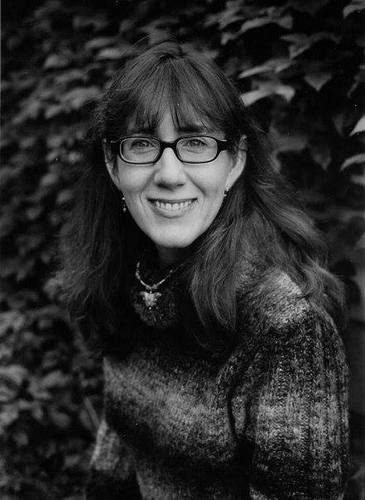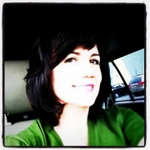Kerry Madden-Lunsford, Author
Kerry Madden-Lunsford grew up traveling around the South as the daughter of a football coach. Her first novel, Offsides, drew on her experiences, but is not an autobiography. She is one of the few writers authorized to write a biography of Harper Lee, Up Close: Harper Lee, which made Booklist’s Ten Top Biographies for 2009 for Youth. She divides her time between Los Angeles, where she is a mentor at Antioch University’s MFA program and Alabama, where she’s an Associate Professor of Creative Writing at the University of Alabama-Birmingham.
She was interviewed via email on March 5th, 2015.
Lisa Trahan: What inspired you to become a writer? Have you always wanted to write, or is it something you discovered you wanted to do later on in life?
Kerry Madden-Lunsford: My fourth grade teacher told me I was a good writer. It was the first time a teacher said anything of the sort. They usually said, “Aren’t you a nice, big, tall girl,” or “Don’t you listen well?” or “You must be an alto.”
LT: Your novels are written for the Young Adult category. How did you choose this age group versus younger children or adult fiction?
KML: Actually, I write more “middle grade” novels, ages nine to twelve, though the Harper Lee biography is YA. I don’t know—I just really love that age. I remember it well, and honestly when I started writing for that age, I thought I was writing YA. The books I read growing up—The Secret Garden, A Little Princess, all the Little House books, A Tree Grows in Brooklyn, and even Sarah T: Portrait of a Teenage Alcoholic still inform the way I write today.
LT: Your first novel, Offsides, deals with life as the daughter of a football coach, based loosely on your own experiences. How did moving so often affect your writing? How was it growing up in such a male-oriented field?
KML: Moving so much made me memorize accents and faces, so I could fit into each place, although the Pittsburgh to Knoxville move was the roughest. My father used to say, “You won’t even remember these people. We got football games to win—now get your ass in the car.” I vowed not to forget out of sheer defiance. It wasn’t easy on the gridiron because I wasn’t a jock or a cheerleader, but then I found the theatre department, and it didn’t matter anymore. I’d found my people. Also, the coaches’ wives were my very first storytellers, and they were hilarious and they let me eavesdrop and hang around the kitchen while they made cheese grits, drank gin and tonics, and told great stories. But come to think of it, I have lived in twelve states and then in England and China. I applied to become an exchange student in England and that year changed my life. I also spent my first year of marriage teaching in China, and now I live in two states—Alabama and California. So I would say that moving greatly affected who I am today in a very positive way. I never would have said that as a kid, but now I really love the adventure. I’ve written so deeply about places where I’ve never lived—Maggie Valley, North Carolina, and Monroeville, Alabama—that I feel like I have lived in those places somehow. I’m drawn to the South because of how crazy it can be, but I miss the west too, where we raised our kids.
LT: You wrote an autobiography of Harper Lee for young adults. How was that different from writing it for adults?
KML: End notes! I had to make sure EVERYTHING was attributed, and if I were to write another biography, I would start doing the end notes immediately. I kept casual track of everything, which meant having to go back and spend weeks organizing and re-checking every detail. Now would I keep those details accurate from the get-go. I loved my interviews—it was amazing to go to Monroeville, Alabama and interview people who grew up with Harper Lee. Their stories and ways of telling a story were a tremendous gift to me. I wanted to do right by them and of course by Nelle Harper Lee herself.
LT: It was announced that Harper Lee is releasing a second book. How do you think that may affect her legacy?
KML: I don’t think it will affect her legacy. Her legacy is bedrock. I’m thrilled for her. It will also give us a chance to see how the young Harper Lee found her voice as a writer.
LT: To Kill a Mockingbird focuses strongly on racism and morality. Are there any themes you like to focus on in your own works?
KML: The new book I’m writing for kids is called Are You There Vulcan? It’s Me Millie-Graciella and it’s about a girl whose father gets deported while living in Birmingham, Alabama. So I definitely feel like it has themes of racism and morality. Millie-Graciella talks to Vulcan, the giant cast iron statue that stands over Birmingham on top of Red Mountain, and she writes letters to him since God quit listening a long time ago. I tend to have themes of risk and starting over, basically fish out of water stories—and that’s certainly been influenced by all the moving I did.
LT: As an associate faculty member at Antioch University, which has a strong social justice focus, do you think there’s been a change in literature towards more diversity?
KML: I absolutely do. I think of the essays and works by Elizabeth Bluemle, Walter Dean Myers, Jacqueline Woodson, Annie Sibley O’Brien, etc. Even the Newbery Award this year, The Cross-Over, by Kwame Alexander, was wonderful news, because not only did he write a fabulous book, he’s reaching out as an author to kids everywhere and letting them know they all have stories to tell. Kids of all races and backgrounds need to see themselves represented in literature, and I’m thrilled we’re moving in that direction.
LT: Have there been any changes in MFA programs in general towards more diversity, and/or social justice that you’ve noticed since you first started writing?
KML: Oh, I think definitely so—we’re also just more aware of diversity. When I was getting my MFA in Playwriting, the most famous woman playwright was Wendy Wasserstein followed by Beth Henley. Mostly we were still doing William Inge, Tennessee Williams, Edward Albee, and then August Wilson was coming on the scene. But it’s not only great to see diversity happening across literature, it’s essential to who we are as artists and storytellers, and so I’m thrilled to see all the new work from Suzan Lori Parks, Junot Diaz, Roxane Gay, Jacqueline Woodson, Nikki Grimes, Kwame Alexander, Jose Rivera, Pam Munoz Ryan, Josefina Lopez and so many others.
LT: What is your writing style and/or do you have a set routine?
KML: I try to write in the mornings or if I get on a roll, I can go all day, but that never happens or rarely happens with teaching and parenting, but I do try to start first thing. I pay myself first—by writing—and then dealing with emails, Facebook (horrible time suck), and just the white noise of the Internet. I switch up and write in different places sometimes too. The dream is when I can go away to a cabin and write—it doesn’t happen much, but I love going away to write and escaping the distractions of home. I try not to beat myself up anymore if I have a shitty writing day.
LT: Do you have any advice you would give writers who are interested in writing young adult fiction?
KML: Read everything. Join SCBWI. Go to their conferences, join their critique groups, go to the writer/illustrator days. Get involved in any way possible. The Society of Children’s Book Writers and Illustrators will help any serious writer navigate the world of Young Adult from picture book to young adult.
LT: What is your most rewarding experience or what do you love best about writing for young adults?
KML: Meeting the kids—I love meeting the kids and going into the classroom. I also just love a good writing day. That’s reward enough for me.
LT: Are you working on any new projects?
KML: I’m working on several pictures books: Georgia Ivy and the Pump Organ, Ernestine’s Milky Way, All Bees Home for Christmas, Who Will Squeeze Olive, and No Licky Chops. Some of them may turn into early reader. I am also working on an adult novel, Hop the Pond, which I’m very close to finishing, (please good God in Heaven let it be done!). It’s 312 pages and we’ve almost reached the moors so the end is nigh. And I have a memoir about teaching in China that I’ve avoided for a while called Laurie Anderson in the Rice Fields. I hope to get back to it one day soon.
LT: Are there any young adult books you are reading right now that are particularly your favorites or you’re looking forward to?
KML: I’ll Give You The Sun by Jandy Nelson, recommended by Antioch student, Tai Farnsworth, and she was so right. My daughter, Norah, read it first and pushed it into my hands and said, “Read this now!” And I’m loving it. I’m reading Kathi Appelt’s The True Blue Scouts of Sugar Man Camp, which is wonderful, and Deborah Wiles’s Revolution. I’m also listening to The Night of the Gun by David Carr, because I’m a sucker for addiction memoirs—he’s the best along with Caroline Knapp, Drinking: A Love Story, and Heather King’s Parched.






